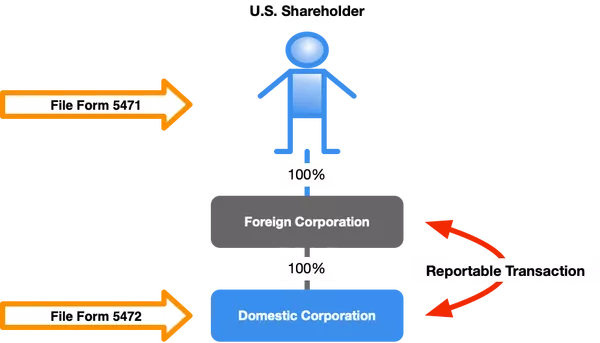- Article Category
- IRS Form 5471
- Published on
Form 5471 and Form 5472 Required? How to Eliminate Form 5472

Phil Hodgen
Attorney, Principal
Share
When you have to file Form 5471 and Form 5472
Sometimes you have a situation where you need to prepare both Form 5471 and Form 5472. Here is a discussion of an exception that allows you to eliminate Form 5472.
Example: a U.S. citizen owns 100% of the stock of a foreign corporation, which in turn owns 100% of a domestic corporation.

When you don’t have to file Form 5472
There are six exceptions that can eliminate a Form 5472 filing obligation. You can see them listed in Instructions for Form 5472 (Rev. 12-2024) on page 2. One of the exceptions applies to situations just like this.
Reg. § 1.6038A-2(e)(3)
Here’s the Regulation:
Instructions for Form 5472 (Rev. 12-2024)
The Instructions for Form 5472 (Rev. 12-2024) give a pretty good explanation of this exception:
The exception discussed here eliminates Form 5472 filing obligation ONLY eliminated for:
- A foreign related corporation (that's a foreign corporation that is "related" to the domestic corporation; see IRC §6038A(c)(2)).
- That is controlled (more than 50% owned; see IRC §6038(e)(2)) by a U.S. person.
- Who files Form 5471 for that foreign corporation.
- And includes Schedule M (Form 5471).
No “control” by one U.S. person? No Form 5472 exception
A United States person must “control” the foreign related corporation. That is the prerequisite for this exception (emphasis added):
Note that the person who has control is defined in the singular: “a” U.S. person.
A person “controls” a foreign corporation when he or she owns more than 50% of the foreign corporation’s stock, by vote or value. IRC §6038(e)(2). Here's an example of a situation where no U.S. person "controls" the foreign corporation:

The foreign corporation is owned by two U.S. persons, each holding 50% of the stock. Neither U.S. person controls the foreign corporation. It is a controlled foreign corporation, and each U.S. shareholder has a Form 5471 filing obligation. It is a foreign related corporation for Form 5472 purposes, and there is a reportable transaction. Therefore it has a Form 5472 filing obligation.
The Form 5472 filing exception does not apply, because a U.S. person, alone, does not “control” the foreign corporation because there is no “greater than 50%” shareholder. The Reg. §1.6038A-2(e)(2) fails.
The exception doesn’t apply to disregarded entities
The exception does not apply where a foreign corporation owns a domestic disregarded entity. The Regulation states (emphasis added):

Summary
In short, use this exception to eliminate Form 5472 filing obligations where:
- That foreign corporation is “related” to the reporting corporation (the domestic corporation but not disregarded entity).
- There is a reportable transaction between the domestic corporation and the foreign corporation.
- One United States person “controls” a foreign corporation—i.e., owns more than 50% of its stock by vote or value. This is the potential “gotcha” in the exception. It doesn’t mean “controlled foreign corporation” because that could mean more than one shareholder. the exception demands a foreign corporation that is “controlled” by one U.S. person.
- The United States person files Form 5471 and attaches Schedule M (Form 5471).
For all other situations, find another exception to eliminate Form 5472 filing obligations, or . . . file Form 5472.
